Lorenzo Porcaro
Towards Responsible AI Music: an Investigation of Trustworthy Features for Creative Systems
Mar 24, 2025Abstract:Generative AI is radically changing the creative arts, by fundamentally transforming the way we create and interact with cultural artefacts. While offering unprecedented opportunities for artistic expression and commercialisation, this technology also raises ethical, societal, and legal concerns. Key among these are the potential displacement of human creativity, copyright infringement stemming from vast training datasets, and the lack of transparency, explainability, and fairness mechanisms. As generative systems become pervasive in this domain, responsible design is crucial. Whilst previous work has tackled isolated aspects of generative systems (e.g., transparency, evaluation, data), we take a comprehensive approach, grounding these efforts within the Ethics Guidelines for Trustworthy Artificial Intelligence produced by the High-Level Expert Group on AI appointed by the European Commission - a framework for designing responsible AI systems across seven macro requirements. Focusing on generative music AI, we illustrate how these requirements can be contextualised for the field, addressing trustworthiness across multiple dimensions and integrating insights from the existing literature. We further propose a roadmap for operationalising these contextualised requirements, emphasising interdisciplinary collaboration and stakeholder engagement. Our work provides a foundation for designing and evaluating responsible music generation systems, calling for collaboration among AI experts, ethicists, legal scholars, and artists. This manuscript is accompanied by a website: https://amresearchlab.github.io/raim-framework/.
Behind Recommender Systems: the Geography of the ACM RecSys Community
Sep 07, 2023Abstract:The amount and dissemination rate of media content accessible online is nowadays overwhelming. Recommender Systems filter this information into manageable streams or feeds, adapted to our personal needs or preferences. It is of utter importance that algorithms employed to filter information do not distort or cut out important elements from our perspectives of the world. Under this principle, it is essential to involve diverse views and teams from the earliest stages of their design and development. This has been highlighted, for instance, in recent European Union regulations such as the Digital Services Act, via the requirement of risk monitoring, including the risk of discrimination, and the AI Act, through the requirement to involve people with diverse backgrounds in the development of AI systems. We look into the geographic diversity of the recommender systems research community, specifically by analyzing the affiliation countries of the authors who contributed to the ACM Conference on Recommender Systems (RecSys) during the last 15 years. This study has been carried out in the framework of the Diversity in AI - DivinAI project, whose main objective is the long-term monitoring of diversity in AI forums through a set of indexes.
Fairness and Diversity in Information Access Systems
May 16, 2023Abstract:Among the seven key requirements to achieve trustworthy AI proposed by the High-Level Expert Group on Artificial Intelligence (AI-HLEG) established by the European Commission (EC), the fifth requirement ("Diversity, non-discrimination and fairness") declares: "In order to achieve Trustworthy AI, we must enable inclusion and diversity throughout the entire AI system's life cycle. [...] This requirement is closely linked with the principle of fairness". In this paper, we try to shed light on how closely these two distinct concepts, diversity and fairness, may be treated by focusing on information access systems and ranking literature. These concepts should not be used interchangeably because they do represent two different values, but what we argue is that they also cannot be considered totally unrelated or divergent. Having diversity does not imply fairness, but fostering diversity can effectively lead to fair outcomes, an intuition behind several methods proposed to mitigate the disparate impact of information access systems, i.e. recommender systems and search engines.
Assessing the Impact of Music Recommendation Diversity on Listeners: A Longitudinal Study
Dec 01, 2022



Abstract:We present the results of a 12-week longitudinal user study wherein the participants, 110 subjects from Southern Europe, received on a daily basis Electronic Music (EM) diversified recommendations. By analyzing their explicit and implicit feedback, we show that exposure to specific levels of music recommendation diversity may be responsible for long-term impacts on listeners' attitudes. In particular, we highlight the function of diversity in increasing the openness in listening to EM, a music genre not particularly known or liked by the participants previous to their participation in the study. Moreover, we demonstrate that recommendations may help listeners in removing positive and negative attachments towards EM, deconstructing pre-existing implicit associations but also stereotypes associated with this music. In addition, our results show the significant clout that recommendation diversity has in generating curiosity in listeners.
Monitoring Diversity of AI Conferences: Lessons Learnt and Future Challenges in the DivinAI Project
Mar 03, 2022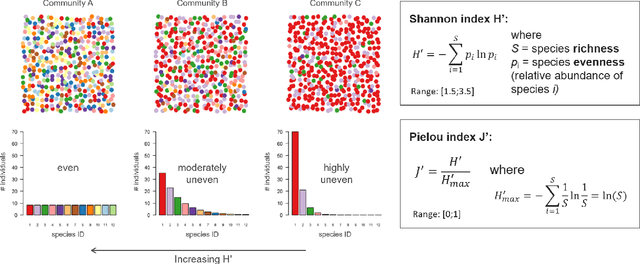
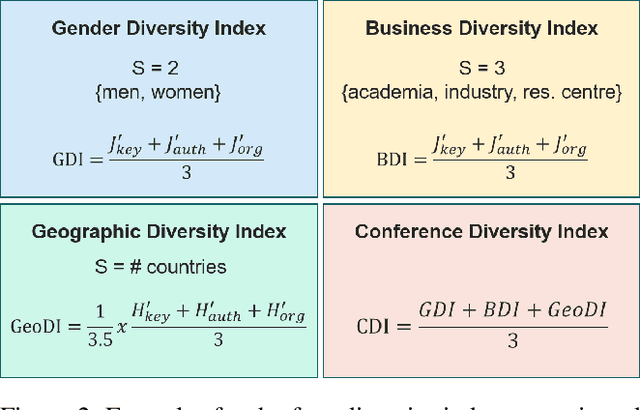
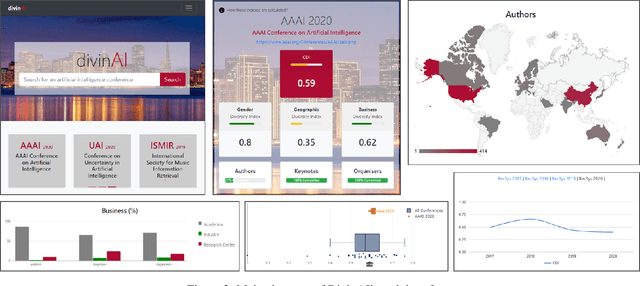
Abstract:DivinAI is an open and collaborative initiative promoted by the European Commission's Joint Research Centre to measure and monitor diversity indicators related to AI conferences, with special focus on gender balance, geographical representation, and presence of academia vs companies. This paper summarizes the main achievements and lessons learnt during the first year of life of the DivinAI project, and proposes a set of recommendations for its further development and maintenance by the AI community.
Fair ranking: a critical review, challenges, and future directions
Jan 29, 2022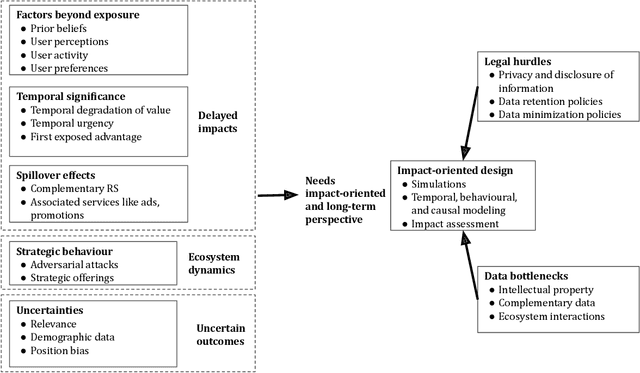



Abstract:Ranking, recommendation, and retrieval systems are widely used in online platforms and other societal systems, including e-commerce, media-streaming, admissions, gig platforms, and hiring. In the recent past, a large "fair ranking" research literature has been developed around making these systems fair to the individuals, providers, or content that are being ranked. Most of this literature defines fairness for a single instance of retrieval, or as a simple additive notion for multiple instances of retrievals over time. This work provides a critical overview of this literature, detailing the often context-specific concerns that such an approach misses: the gap between high ranking placements and true provider utility, spillovers and compounding effects over time, induced strategic incentives, and the effect of statistical uncertainty. We then provide a path forward for a more holistic and impact-oriented fair ranking research agenda, including methodological lessons from other fields and the role of the broader stakeholder community in overcoming data bottlenecks and designing effective regulatory environments.
Diversity in the Music Listening Experience: Insights from Focus Group Interviews
Jan 25, 2022Abstract:Music listening in today's digital spaces is highly characterized by the availability of huge music catalogues, accessible by people all over the world. In this scenario, recommender systems are designed to guide listeners in finding tracks and artists that best fit their requests, having therefore the power to influence the diversity of the music they listen to. Albeit several works have proposed new techniques for developing diversity-aware recommendations, little is known about how people perceive diversity while interacting with music recommendations. In this study, we interview several listeners about the role that diversity plays in their listening experience, trying to get a better understanding of how they interact with music recommendations. We recruit the listeners among the participants of a previous quantitative study, where they were confronted with the notion of diversity when asked to identify, from a series of electronic music lists, the most diverse ones according to their beliefs. As a follow-up, in this qualitative study we carry out semi-structured interviews to understand how listeners may assess the diversity of a music list and to investigate their experiences with music recommendation diversity. We report here our main findings on 1) what can influence the diversity assessment of tracks and artists' music lists, and 2) which factors can characterize listeners' interaction with music recommendation diversity.
Perceptions of Diversity in Electronic Music: the Impact of Listener, Artist, and Track Characteristics
Jan 28, 2021



Abstract:Shared practices to assess the diversity of retrieval system results are still debated in the Information Retrieval community, partly because of the challenges of determining what diversity means in specific scenarios, and of understanding how diversity is perceived by end-users. The field of Music Information Retrieval is not exempt from this issue. Even if fields such as Musicology or Sociology of Music have a long tradition in questioning the representation and the impact of diversity in cultural environments, such knowledge has not been yet embedded into the design and development of music technologies. In this paper, focusing on electronic music, we investigate the characteristics of listeners, artists, and tracks that are influential in the perception of diversity. Specifically, we center our attention on 1) understanding the relationship between perceived diversity and computational methods to measure diversity, and 2) analyzing how listeners' domain knowledge and familiarity influence such perceived diversity. To accomplish this, we design a user-study in which listeners are asked to compare pairs of lists of tracks and artists, and to select the most diverse list from each pair. We compare participants' ratings with results obtained through computational models built using audio tracks' features and artist attributes. We find that such models are generally aligned with participants' choices when most of them agree that one list is more diverse than the other, while they present a mixed behaviour in cases where participants have little agreement. Moreover, we observe how differences in domain knowledge, familiarity, and demographics can influence the level of agreement among listeners, and between listeners and diversity metrics computed automatically.
Measuring Diversity of Artificial Intelligence Conferences
Jan 20, 2020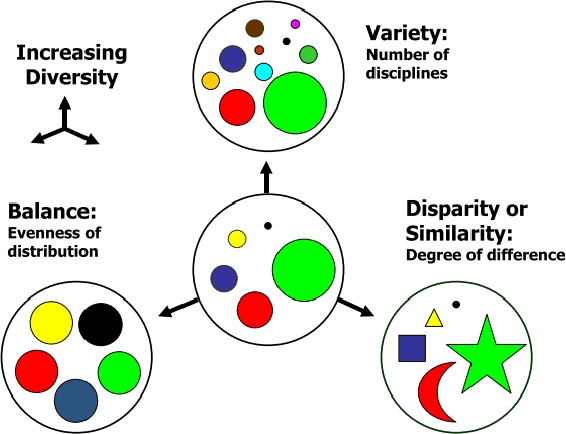



Abstract:The lack of diversity of the Artificial Intelligence (AI) field is nowadays a concern, and several initiatives such as funding schemes and mentoring programs have been designed to fight against it. However, there is no indication on how these initiatives actually impact AI diversity in the short and long term. This work studies the concept of diversity in this particular context and proposes a small set of diversity indicators (i.e. indexes) of AI scientific events. These indicators are designed to quantify the lack of diversity of the AI field and monitor its evolution. We consider diversity in terms of gender, geographical location and business (understood as the presence of academia versus industry). We compute these indicators for the different communities of a conference: authors, keynote speakers and organizing committee. From these components we compute a summarized diversity indicator for each AI event. We evaluate the proposed indexes for a set of recent major AI conferences and we discuss their values and limitations.
Recognizing Musical Entities in User-generated Content
Apr 01, 2019
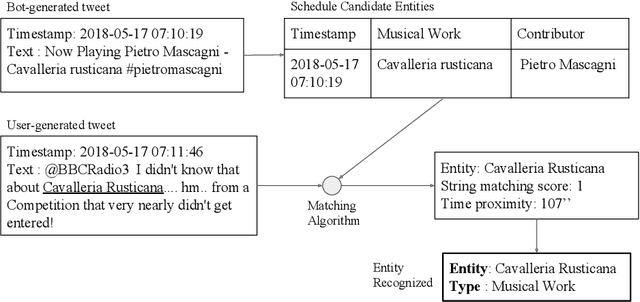


Abstract:Recognizing Musical Entities is important for Music Information Retrieval (MIR) since it can improve the performance of several tasks such as music recommendation, genre classification or artist similarity. However, most entity recognition systems in the music domain have concentrated on formal texts (e.g. artists' biographies, encyclopedic articles, etc.), ignoring rich and noisy user-generated content. In this work, we present a novel method to recognize musical entities in Twitter content generated by users following a classical music radio channel. Our approach takes advantage of both formal radio schedule and users' tweets to improve entity recognition. We instantiate several machine learning algorithms to perform entity recognition combining task-specific and corpus-based features. We also show how to improve recognition results by jointly considering formal and user-generated content
 Add to Chrome
Add to Chrome Add to Firefox
Add to Firefox Add to Edge
Add to Edge